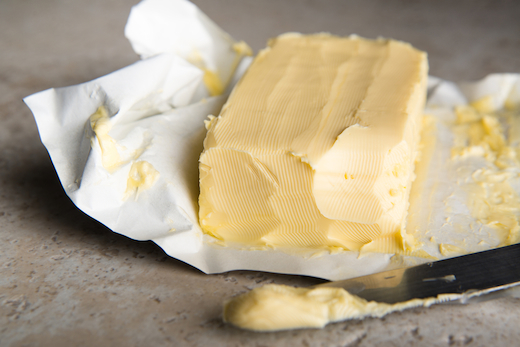Butter and margarine serve the same purpose. They are used for cooking, baking and as spreads.

Butter has been a dietary stable for centuries.
It is made by churning the fatty portion of cow’s milk until it turns into the final product… butter. That’s it.
Margarine is totally different. It is a highly processed food that was invented to replace butter. The primary ingredient is vegetable oil along with emulsifiers, colorants and various artificial ingredients.
Vegetable oil is liquid at room temperature. This is why margarine is often hydrogenated, which gives it a harder consistency and extends shelf life. Hydrogenation also turns some of the vegetable oils into trans fats.
Butter has been demonized by the media and nutrition professionals because it contains large amounts of both saturated fat and cholesterol.
They found absolutely no association between saturated fat and cardiovascular disease. Other studies lead to the same conclusion.
Eating saturated fat actually improves the blood lipid profile. It raises HDL (the “good”) cholesterol and changes the LDL from small, dense LDL (very bad) to Large LDL. Eating cholesterol rich foods like eggs leads to the same improvements in blood lipid profiles. The LDL pattern improves and HDL goes up.
Neither saturated fat nor dietary cholesterol harm the blood lipid profile. They raise the good (HDL) cholesterol and change the LDL cholesterol to a benign subtype that is not associated with heart disease.
Margarine is loaded with vegetable oils and (sometimes) trans fats. Excess consumption of these fats is associated with many serious diseases, including heart disease. It is true that margarine lowers total and LDL cholesterol in the short term. However, it also lowers HDL (the good) cholesterol. Reducing cholesterol doesn’t necessarily reduce the risk of heart disease.
Both Margarine and butter contain the same amount of calories present in them. On the contrary butter contains natural fats, which are essential for the strengthening the bones and has many nutritional benefits.
Excess intake of margarine can worsen illnesses such as colitis and arthritis. The hardening agents used in the production of margarine include nickel and cadmium. Nickel is a toxic metal that when consumed in excess, causes lung and kidney problems. Cadmium is among the most toxic of the heavy metals. It may contribute to serious diseases such as arteriosclerosis, high blood pressure and malignancy.
Solution
The best way to control the rising cholesterol levels, is by eating everything in moderation and not anything in excess. All products such as eggs, full cream milk, etc. contain minerals and proteins which are essential for the bones and cutting out these products will only lead to further health hazards.

Butter has been a dietary stable for centuries.
It is made by churning the fatty portion of cow’s milk until it turns into the final product… butter. That’s it.
Margarine is totally different. It is a highly processed food that was invented to replace butter. The primary ingredient is vegetable oil along with emulsifiers, colorants and various artificial ingredients.
Vegetable oil is liquid at room temperature. This is why margarine is often hydrogenated, which gives it a harder consistency and extends shelf life. Hydrogenation also turns some of the vegetable oils into trans fats.
Butter has been demonized by the media and nutrition professionals because it contains large amounts of both saturated fat and cholesterol.
They found absolutely no association between saturated fat and cardiovascular disease. Other studies lead to the same conclusion.
Eating saturated fat actually improves the blood lipid profile. It raises HDL (the “good”) cholesterol and changes the LDL from small, dense LDL (very bad) to Large LDL. Eating cholesterol rich foods like eggs leads to the same improvements in blood lipid profiles. The LDL pattern improves and HDL goes up.
Neither saturated fat nor dietary cholesterol harm the blood lipid profile. They raise the good (HDL) cholesterol and change the LDL cholesterol to a benign subtype that is not associated with heart disease.
Margarine is loaded with vegetable oils and (sometimes) trans fats. Excess consumption of these fats is associated with many serious diseases, including heart disease. It is true that margarine lowers total and LDL cholesterol in the short term. However, it also lowers HDL (the good) cholesterol. Reducing cholesterol doesn’t necessarily reduce the risk of heart disease.
Both Margarine and butter contain the same amount of calories present in them. On the contrary butter contains natural fats, which are essential for the strengthening the bones and has many nutritional benefits.
Excess intake of margarine can worsen illnesses such as colitis and arthritis. The hardening agents used in the production of margarine include nickel and cadmium. Nickel is a toxic metal that when consumed in excess, causes lung and kidney problems. Cadmium is among the most toxic of the heavy metals. It may contribute to serious diseases such as arteriosclerosis, high blood pressure and malignancy.
Solution
The best way to control the rising cholesterol levels, is by eating everything in moderation and not anything in excess. All products such as eggs, full cream milk, etc. contain minerals and proteins which are essential for the bones and cutting out these products will only lead to further health hazards.

No comments:
Post a Comment